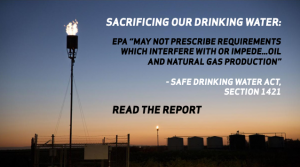
By John Noel, National Oil and Gas Program Coordinator - Follow John on Twitter (@Noel_Johnny)
This week Clean Water Action released a first-ever analysis of the little known Aquifer Exemption program within EPA’s Underground Injection Control program. For those concerned about clean drinking water supplies for future generations, transparency within the Environmental Protection Agency, and the cavalier attitude oil and gas interests take towards regulation of their operations, this report is for you.
What is wrong with Aquifer Exemptions?
First, the program exists.
A clause inserted during the development of the Safe Drinking Water Act (SDWA), thanks to oil and gas industry lobbying, helped tilt the balance of the Act in favor of fossil fuel extraction instead of drinking water protection. Specifically, this little Easter egg, inserted into Section 1421, states: EPA “may not prescribe requirements which interfere with or impede…oil and natural gas production,” what?
This explains why, when the final EPA regulations were written, the aquifer exemption clause was included to let certain activities occur in drinking water which would otherwise be illegal. One example, if an oil and gas company wanted to inject fracking wastewater underground for disposal and the area it was injecting into also contained a drinking water source, this would typically be illegal under the SDWA. However, the company can apply for an exemption and have the pollution protections lifted and then proceed to inject wastewater directly into the once protected drinking water source. Once this happens the aquifer is destroyed and off limits for future generations.
Now you might be asking, “OK now we know that yes, this type of thing can happen legally, but there must be a rigorous oversight and enforcement mechanism in place because this sounds like a big deal, right?”
Wrong. Our research shows that implementation and oversight of aquifer exemptions is wholly inadequate. EPA and some states have run the program in such an inconsistent way that no one has an idea of how many exemptions were granted nationwide. Similarly we do not know if the public was given the required opportunity to participate in the process or even given notice that an aquifer nearby was up for an exemption.
Not only is the oversight lacking but the actual criteria for allowing an exemption were written over 30 years ago. As written it does not reflect current environment challenges presented by climate change such as water scarcity and drought issues and even allows aquifers to be written off that are readily (and economically) treatable under existing technology.
We need to loudly be asking -- what are the long terms costs of such short sighted behavior? What are the unforeseen consequences of sacrificing long term water supplies for short term interests?
Just like the oil and gas industry couldn’t predict that their oil trains would start exploding, or that injecting their wastewater underground at high pressures would cause earthquakes, or that the fugitive methane emissions from their “clean natural gas” would kick climate change into overdrive – how then can the industry be sure that deleting freshwater from future reserves for private profit will not also have dire consequences for the public at large?
Profiting Off of the Unknown
Hardly anyone really understands this stuff outside of the oil patch and that is the problem.
The oil and gas industry has been able to get away with this type of slippery tactic ever since our federal environmental regulations were first written. It’s a small club of companies, industry trade groups and associated interested that are profiting off of the fact that everyone else is in the dark. The general public and even some state and federal regulators do not fully comprehend just how out of synch these exemptions are with public health and environmental protection.
While Aquifer Exemptions are mostly used as a cost saving and convenience measure for fossil fuel companies, drinking water is part of our natural heritage, a resource we as a society are entrusted to protect for those that come after us. Exemptions cannot be touted as some sort of faux economic choice between price per barrel of oil and freshwater.
It’s a new year and Clean Water Action is blazing a new path, one that shines light into the dark regulatory corners of the energy extraction industry and we are going to need your help. It’s been a long time coming with aquifer exemptions and here we are.
TWEET: http://ctt.ec/T5nw5
5000 sources of drinking water sacrificed for oil and gas company profits. Read it. Share it. Its happening http://goo.gl/l03EW6
Millions of gallons of #fracking wastewater injected in drinking water – legally. NEW REPORT @cleanh2oaction
The referenced media source is missing and needs to be re-embedded.
Sacrificing Our Drinking Water for Oil and GasRelated Posts
Stay Informed
Get the latest updates and actions:
Thanks for signing up!
There was a problem processing your signup. Please try again.


